SNHU Students Advance as Women in Tech at Grace Hopper Celebration
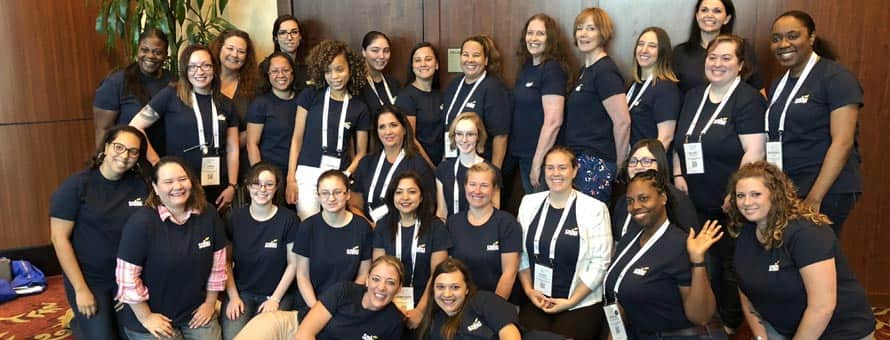
More than two dozen women from around the world - all of them are Southern New Hampshire University (SNHU) students earning technology-related degrees - traveled to the 2018 Grace Hopper Celebration in Houston, Texas, in late September. Of the nearly 30 women, 4 are Manchester, New Hampshire campus students and the remaining are in online degree programs, each whom came to Houston from many states nationwide and as far away as Belize.
Billed as the largest gathering of women technologists, this year's conference hosted 22 thousand attendees. Produced by AnitaB.org, in partnership with the Association for Computing Machinery (ACM), the Grace Hopper Celebration (GHC) was founded in 1994, inspired by and honoring Navy Rear Admiral Grace Murray Hopper, an early computer scientist and programmer.
Its early goal - "to offer women the chance to improve their technical skills and connect with each other," according to the AnitaB.org website - remains at the center of the conference still today, with a significant focus on bringing some of the top names and most innovative women in technology together to provide career and networking opportunities, learning and empowerment to other women in fields that historically have been predominantly male-oriented.
Pathways for Women into the Technology Sector
Recent research, released in mid-Sept. by Melinda Gates in partnership with McKinsey & Company, notes "the technology sector occupies a unique role in our society as one of our most powerful engines for economic growth and social mobility. Ensuring more women have pathways into this sector is both a fundamental issue of equity and a business imperative."
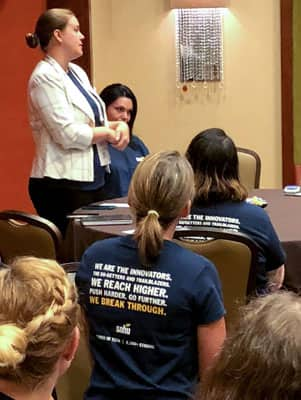
With nearly 2,400 women in STEM degree programs online and on campus, SNHU is focused on growing those numbers and providing its diverse global population with experiential learning not only in the classroom but through conferences and events like GHC. While ages, culture, backgrounds, life experiences, degree programs and career aspirations vary, these women are eager to move forward and make their mark in technology. Students have engaged in Pax East, GHC, Women in Cybersecurity, National Cyber League and Teradata data competitions and other professional and student activities and conferences, which allow them to showcase what they have to offer and network with others in the industry, gain internships and pursue new roles in the tech field.
SNHU Women at GHC
In addition to students who applied for consideration of attending the conference with SNHU and were chosen to represent the university, five additional women traveled to GHC as Grace Hopper Scholars. These students, Elizabeth Tatuls, Lisa Kirby, Nalisha Varnado, Stephanie Seitz and Stephanie Marshall, were selected from a global pool of applicants by Anita Borg Institute, to attend, with all expenses paid through sponsorships from prominent organizations.
There were also alumnae, such as Amelia Manni '17G, now attending GHC as professional development or in a recruiting capacity for their employers. Manni, like many other SNHU students, interviewed with prospective companies at an earlier conference and was offered a job as an IT analyst with Cisco. She also teaches in the university's online STEM degree programs.
The 2018 event proved advantageous for SNHU students, most of whom not only networked with women from employers throughout the country and world, but also had opportunities to interview for full-time positions and internships. Within the first day, one SNHU student received a job offer with another 5 offers coming to other students in the next two days and another offer in the week to follow. Many have upcoming interviews and potential internships.
SNHU students attending GHC also included: Alaine Garcia, Alyssa Cote, Ann Druide, T'Cheznavia Cherry, Corinne Ridgley, Damayanti Subedi, Ilona Pelerin, Damayanti Subedi, Jessica Kamman, Julie Hautzenroeder, Kelsey Beaudion, Kody Goldsmith, Krissa Green, Sharonda Brim, Linda Morgan, Marissa Kulz, Melissa Hardy, Madison Jaquith, Brenda Walker, Sharon Robertson, Davida Monahan, Rosemary Rodriguez, Ilona Pelerin, Shajira Martinez, Tracy Anderson, Victoria Perez and Naomi Mathena.
Some of the women shared their aspirations and experiences:
Before GHC, Corinne Ridgley had two phone interviews with one company, following up with the organization at the conference career fair and secured two more, offered onsite. "They went well, and employers were genuinely interested in my experience and goals," she said. "It felt more personal than applying for a random job and speaking with any old recruiter."
Perhaps it's not surprising that Ridgley was the first of the SNHU students this year to receive a job offer and before the first day of the conference was through.
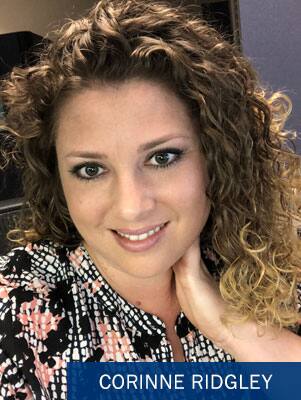
She made a lot of contacts at GHC. "What I found most interesting were the contacts I made that had more experience and were more than willing to provide advice on different ways to gain experience or their thoughts on what would be most valuable to learn," Ridgley said.
Currently earning a master's in information technology with a concentration in software application development, Ridgley assumed that IT involved intensive coding experience. She learned more about the options available to her with what she said a non-traditional background going from a product manager to a programmer. "I learned how although my background in databases seemed limiting in transitioning to software engineering, there's actually a variety of software engineering options including software engineers involving data," she said.
Perhaps even more important, she learned she's not on the only one from a non-traditional background. "I initially felt alone and that I had nothing to offer," Ridgley said. "I learned that if I keep pushing myself out of my comfort zone, I can achieve my goals professionally."
A big takeaway for her was that it's more important to try something new than to maintain the status quo. "Many successful women in technology shared stories about their struggles, and it all started with pushing their own personal boundaries and taking presented opportunities instead of fighting them to maintain tunnel vision," Ridgley said. "Even a foot in the door not doing quite what you want could lead you down the path to getting exactly what you want professionally."
Sharonda Brim went to GHC not knowing if she was interested in looking for a job or not and came away not only realizing a new area in technology she'd like to part of - AR/VR immersive experience - but a better understanding of what she has to offer, too. "My biggest takeaway is that I have the chance to make an impact and empower other girls and women to conquer every obstacle in their way and pursue nothing less than their best," Brim said. "It's important for me to create my vision and then help others reach theirs."
She was impressed by the "amazing stories that I heard not only from the speakers but the other women I met," she said. "Seeing so many women from different backgrounds, ages, ethnicities all coming together to support one another, learn and grow was incredible to me."
The experience taught her that she has to stop comparing herself to others. "We all bring something unique to the industry," Brim said, who is earning a master's in information technology with a concentration in web design.
Julie Hautzenroeder's daughter is also interested in technology, and her mother's experience and knowledge will no doubt influence her in her journey forward. Attending GHC meant a lot to Hautzenroeder, who's earning her master's in IT. She expressed her appreciation for the opportunity and to SNHU not only for providing it but because she felt those leading the women "helped make this experience so amazing and helped us seize every opportunity."

Hautzenroeder took full advantage of her time at GHC. She secured an interview at the job fair and was invited to a meet and greet. "For the meet-and-greet, I was invited to the booth because I posted my resume on the GHC/AnitaB.org site," she said. "I generally found that if I was approachable when speaking with them (to organizations in the career fair), they were more open to speaking with me."
Like many of the women at GHC, the experience proved to be a confidence builder. "I learned that I actually know more than I give myself credit for," Hautzenroeder said. "While I am still a beginner, I gained resources to further and supplement my schooling on my own time."
Hautzenroeder is in the final stretch of her master's in information technology with a concentration in information security. The conference has become the motivation to "push through the last year of classes because the payoff will be life changing," she said. "Being a woman in the tech industry is empowering."
For Davida Monahan, "the sheer number of participants, the energy, the enthusiasm and feeling of connectedness as a group of women in the tech field was most impressive." While she hadn't planned on interviewing at the career fair, she received many requests for interviews from companies there and thoroughly researched each one. She took advantage of networking, too.
"The networking component was outstanding. I participated in the mentor circles, one of which focused on networking and how to do it effectively," Monahan said. "They really made feel like I could do anything...if I just get out there and sell myself."
The most important she learned was that tech companies are out there looking for women and that myriad opportunities was available at GHC. On a personal level, Monahan said she always felt a little crazy to have left a secure position as a nurse practitioner to pursue her dream of a career in IT at a point in life that most people are thinking of retiring. "There was a quote from a woman in the tech in history gallery that said something like 'nothing was ever gained by not taking a chance and trying.' Those are not the exact words but it struck me as confirmation I was doing what's right for me," she said.
Like so many of her student counterparts from SNHU, her biggest takeaway was confidence. "They made me feel like anything is possible," she said. "I know it is. I just have to do the work."
T'Cheznavia Cherry's experience at GHC was "out of this world," she said. "This 3-day conference was amazing. There was something for everybody, whether it was sessions, receptions, networking, technology showcase, etc."
It was the technology showcase that really fascinated Cherry, where she had to mock up a booth like the ones done professionally at GHC. Her goal was to showcase the work she had in her portfolio throughout her bachelor's degree program in graphic and web design. "Now I know what it takes to build a booth," she said. "Now, my portfolio booth was nothing compared to the one seen in the technology showcase, but to see how major companies portrayed themselves to others is amazing."
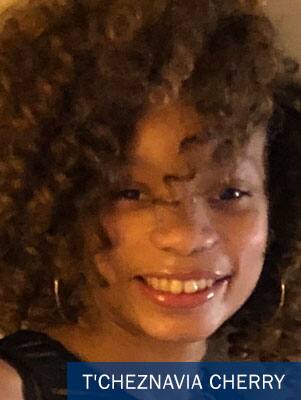
"From the career fair, I learned that most companies have what is called a technology rotation program," she said. "Companies will rotate you in different areas of the company, and at the end of the program, you have the ability to select an area that is most suitable for you. So, what I took away from that is no matter how many interests you the company will strive to place you in an area where you feel most comfortable."
Cherry learned that she does belong in the technology field, regardless of how many interests she has, that companies will do their best to place her where she feels comfortable - and that it's okay not to have a central focus as she moves forward in her career. Currently working toward her master's in information technology, Cherry said, "My biggest takeaway was taking in the atmosphere, making connections, building a network and encouraging other young girls...in the technology field."
Krissa Green said at most of the conferences she's attended people don't want to talk and aren't willing to connect. That wasn't the case at GHC. "How easy it was to meet people" made a real impression on her and not just in general, either. When attending the various breakout sessions, she said, "Every talk was about something new and amazing, but the audience members all wanted to talk and each speaker offered to stay behind and talk more."
Green met a Microsoft employee, who took her around to meet others she knew at different companies. "It helped talk to more people than I would have on my own," she said. "It was an excellent networking experience for me. The first night of the conference, I stayed behind to talk with a game developer and two other people who did the same. We ended up talking for hours in the hallway and...having dinner together, exchanging information and getting to know each other." As a student earning her master's in information technology with a concentration in game design and development, this experience was especially meaningful.
The networking component was important for Green. "I learned that I'm capable of networking," she said. "It has been the hardest thing for me to do and at the conference I was able to network exceptionally well. I need to attend more events like this. It was amazing meeting so many people with similar interests and actually talking to the recruiters I apply to."
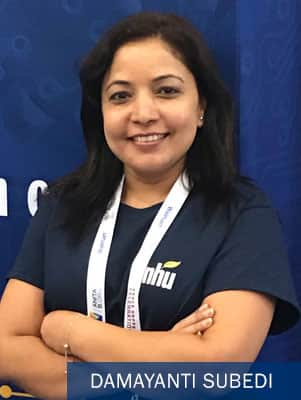
For Subedi, the career fair was a big hit. "It provided me with the lifetime opportunity to meet so many amazing companies who were interested in hiring women in technology," she said. "I could explore different companies and talk to the recruiters about different perspectives of the positions as well as the companies I was interested in."
Subedi interviewed for two positions with Dell, a customer service engineer, and a quality engineer. "Susan Rundbaken (software engineering manager) from Dell EMC told me that she liked my attitude. I don't know if I will eventually be offered one of these positions, but that interview really enhanced my performance in the conference," she said. "After talking to many companies, I found out that there are many opportunities for me like QA engineer, product manager, IT project management, etc. Down the line, I also learned that I can be a software engineer and I was really impressed with so many women software engineers. Thus, I have added entry level software engineer to my search list for the job."
GHC allowed Subedi to realize that she is doing something big earning her BS in Computer Science degree and she "felt totally fortunate being part of the revolution and change." She saw firsthand how women are contributing to the innovation and growth in the tech world.
"The other takeaway was, somewhere at the corner of my heart I was scared with IT but no more now," she said. "I came back more confident and motivated."
For Caitlin Glennen, a career early engagement partner at SNHU, who works primarily to link career milestones and academic programs for STEM disciplines and healthcare programs, this annual conference is one she looks forward to attending with students each year.
"GHC fills my soul," she said. "It is everything that these women need to see to understand that their goals can happen. It gives them the motivation to finish what they started, sometimes years ago.
GHC allowed Alaine Garcia to reaffirm "I am on the right path that I need to continue with my education and pursuing my career goals." The conference provided a chance to go after some of those goals as she earns her bachelor's in management information systems (MIS).
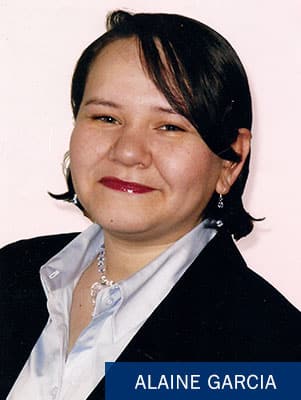
The career fair was a big hit with Garcia, who called it "a fantastic experience." She secured an interview with Northrop Grumman. "My experience was made possible by SNHU staff...they listened to what my goals were, in particular, to work for the aerospace industry," she said. "In the past, I have applied for Northrup Grumman on my own, to no avail. With the proper introductions, I was able to tell my story and secure the interview."
While Garcia thought the interview would be a casual conversation with a recruiter, she instead spoke with the hiring manager. "She said she loved my story," she said. Plans are in the works for follow-up from Northrup Grumman in the weeks ahead.
The networking component of the conference went well for Garcia. "I made some key contacts, and I'm not afraid to say some excellent friends, that I know I will stay in touch with in the future," she said. "When you attend a conference like this, you will bond with your roomie, and you share experiences with other women who are going through similar situations."
Garcia sums up GHC in one word: inspiration. "Many women are inspiring and creating a whole new wave of technology innovation," she said. "Historically, there have been women breaking down barriers and inspiring new generations of women in technology. I look forward to continuing it in that tradition."
Pamme Boutselis is a writer and content director in higher education. Follow her on Twitter @pammeb or connect on LinkedIn.
Explore more content like this article

What is IT? Understanding Information Technology Today

SNHU Spotlight: Alex Petitto, BS in Cybersecurity Grad

SNHU Spotlight: Remus Figueroa Orozco '23: BS in Cybersecurity
About Southern New Hampshire University

SNHU is a nonprofit, accredited university with a mission to make high-quality education more accessible and affordable for everyone.
Founded in 1932, and online since 1995, we’ve helped countless students reach their goals with flexible, career-focused programs. Our 300-acre campus in Manchester, NH is home to over 3,000 students, and we serve over 135,000 students online. Visit our about SNHU page to learn more about our mission, accreditations, leadership team, national recognitions and awards.

